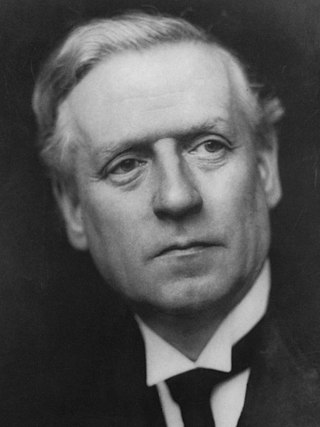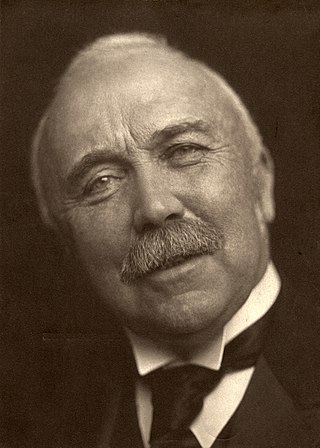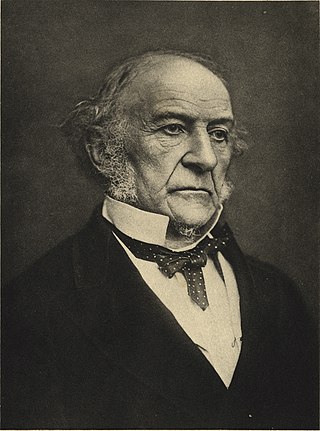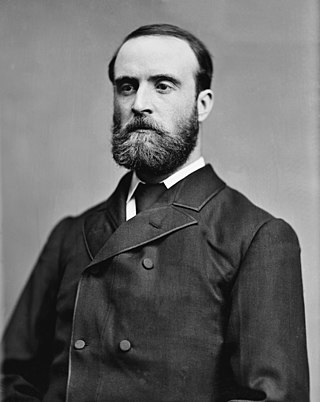
The United Kingdom is a constitutional monarchy which, by legislation and convention, operates as a unitary parliamentary democracy. A hereditary monarch, currently King Charles III, serves as head of state while the Prime Minister of the United Kingdom, currently Sir Keir Starmer since 2024, serves as the head of the elected government.
The Liberal Unionist Party was a British political party that was formed in 1886 by a faction that broke away from the Liberal Party. Led by Lord Hartington and Joseph Chamberlain, the party established a political alliance with the Conservative Party in opposition to Irish Home Rule. The two parties formed the ten-year-long coalition Unionist Government 1895–1905 but kept separate political funds and their own party organisations until a complete merger between the Liberal Unionist and the Conservative parties was agreed to in May 1912.

The 1966 United Kingdom general election was held on Thursday 31 March 1966. The result was a landslide victory for the Labour Party led by Prime Minister Harold Wilson.

The Unionist Party was the main centre-right political party in Scotland between 1912 and 1965.

The 1951 United Kingdom general election was held twenty months after the 1950 general election, which the Labour Party had won with a slim majority of just five seats. The Labour government called a snap election for Thursday 25 October 1951 in the hope of increasing its parliamentary majority.

The 1924 United Kingdom general election was held on Wednesday 29 October 1924, as a result of the defeat of the Labour minority government, led by Prime Minister Ramsay MacDonald, in the House of Commons on a motion of no confidence. It was the third general election to be held in less than two years. Parliament was dissolved on 9 October.

The 1918 United Kingdom general election was called immediately after the Armistice with Germany which ended the First World War, and was held on Saturday, 14 December 1918. The governing coalition, under Prime Minister David Lloyd George, sent letters of endorsement to candidates who supported the coalition government. These were nicknamed "Coalition Coupons", and led to the election being known as the "coupon election". The result was a massive landslide in favour of the coalition, comprising primarily the Conservatives and Coalition Liberals, with massive losses for Liberals who were not endorsed. Nearly all the Liberal MPs without coupons were defeated, including party leader H. H. Asquith.

The December 1910 United Kingdom general election was held from 3 to 19 December. It was the last general election to be held over several days and the last to be held before the First World War.

The January 1910 United Kingdom general election was held from 15 January to 10 February 1910. The government called the election in the midst of a constitutional crisis caused by the rejection of the People's Budget by the Conservative-dominated House of Lords, in order to get a mandate to pass the budget. It was the final general election to be held during the reign of King Edward VII, as he died later that year on 6 May and was succeeded by his son, George V.

The 1906 United Kingdom general election was held from 12 January to 8 February 1906. The Liberals, led by Prime Minister Henry Campbell-Bannerman, won a landslide majority at the election. The Conservatives led by Arthur Balfour, who had been in government until the month before the election, lost more than half their seats, including party leader Balfour's own seat in Manchester East, leaving the party with its fewest recorded seats ever in history until 2024. The election saw a 5.4% swing from the Conservative Party to the Liberal Party, the largest-ever seen at the time. This has resulted in the 1906 general election being dubbed the "Liberal landslide", and is now ranked alongside the 1924, 1931, 1945, 1983, 1997, 2001, and 2024 general elections as one of the largest landslide election victories.

The 1900 United Kingdom general election was held between 26 September and 24 October 1900, following the dissolution of Parliament on 25 September. Also referred to as the Khaki Election, it was held at a time when it was widely believed that the Second Boer War had effectively been won.

The 1895 United Kingdom general election was held from 13 July to 7 August 1895. The result was a Conservative parliamentary majority of 153.

The 1892 United Kingdom general election was held from 4 to 26 July 1892. It saw the Conservatives, led by Lord Salisbury again win the greatest number of seats, but no longer a majority as William Ewart Gladstone's Liberals won 80 more seats than in the 1886 general election. The Liberal Unionists who had previously supported the Conservative government saw their vote and seat numbers go down.

The 1885 United Kingdom general election was held from 24 November to 18 December 1885. This was the first general election after an extension of the franchise and redistribution of seats. For the first time a majority of adult males could vote and most constituencies by law returned a single member to Parliament, fulfilling one of the ideals of Chartism to provide direct single-member, single-electorate accountability.

North Antrim is a parliamentary constituency in the United Kingdom House of Commons. The current MP is Jim Allister (TUV).

The Redistribution of Seats Act 1885 was an Act of the Parliament of the United Kingdom. It was a piece of electoral reform legislation that redistributed the seats in the House of Commons, introducing the concept of equally populated constituencies, a concept in the broader global context termed equal apportionment, in an attempt to equalise representation across the UK. It mandated the abolition of constituencies below a certain population threshold. It was associated with, but not part of, the Representation of the People Act 1884.
London University was a university constituency electing one Member of Parliament (MP) to the House of Commons of the Parliament of the United Kingdom, from 1868 to 1950.
The 1886 Derby by-election was a parliamentary by-election held for the House of Commons constituency of Derby, the county town of Derbyshire on 9 February 1886.

The 1885 general election in Ireland was the first election following the Representation of the People Act 1884 and the Redistribution of Seats Act 1885, which redrew the Irish electoral landscape.


















